By: Kyla-Drew Simmons
One tweet, an 8-second video, and 3.2 million views was all it took for the Cardinal Divas of SC to become a viral sensation and take the world by storm.
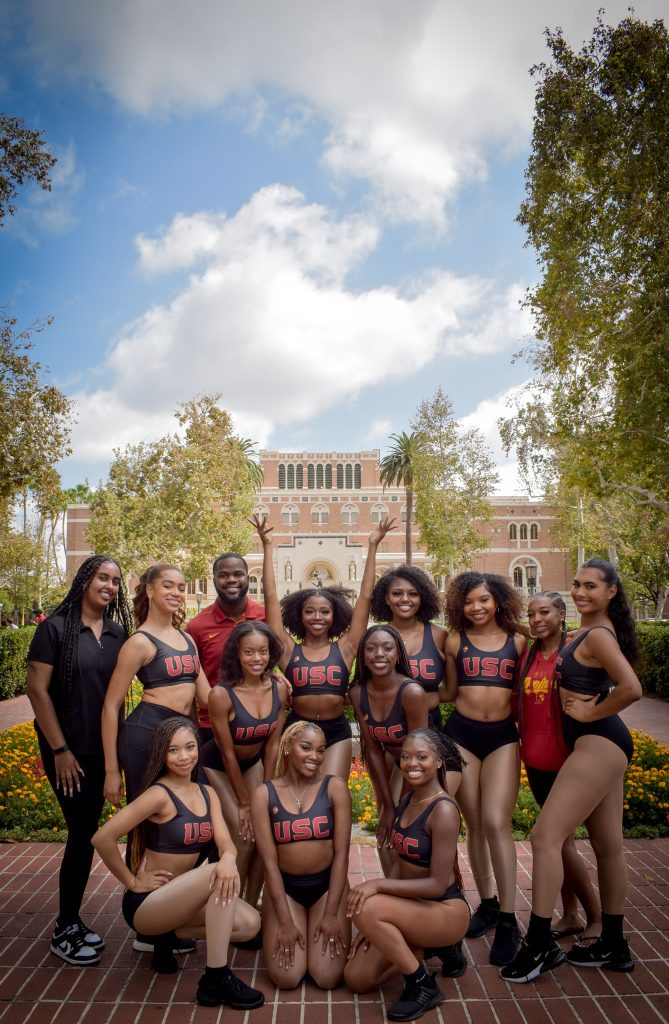
Chicago native Princess Isis Lang is the founder and captain of the Cardinal Divas of SC, the first majorette dance team at the University of Southern California. Lang, who has been dancing majorette since middle school, was not prepared for the national media attention to come.
Lang coined her mom as the guiding light behind her vision for the majorette team. “Girl, you better make this team if this is something that you are passionate about and want to do,” her mother told her at the beginning of her freshman year where she felt the lack of representation and diversity on the current USC spirit squads including the world-renowned Song Girls, Spirit Squad, and the Trojan Dance Force.
“I was looking at all of the dance programs and cheer teams that we had here at USC and I didn’t see any that really reflected who I was as a dancer or an individual in general,” Lang said.
Lang’s first year at USC was held virtually, so her sophomore year she made it a mission to get involved with USC Athletics and start networking with individuals who could potentially turn her dreams into reality. The team became an official registered student organization in March 2020.
The support came immediately at the Cardinal Divas debut on September 17 when USC football defeated Fresno State. “What was really exciting is that our head coach Lincoln Riley came up to us after the game and showed support and gratitude towards us.”
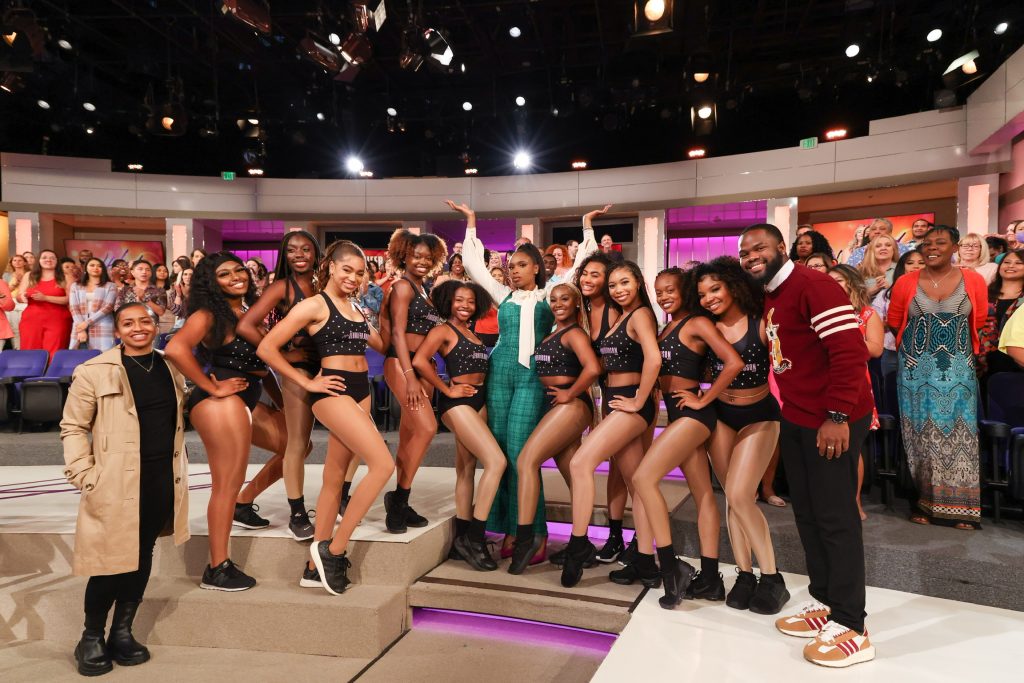
The social media frenzy led to the Cardinal Divas performance and interviews on the Jennifer Hudson Show, Good Morning America, KTLA, NBC, and even longer-form broadcast story on SportsCenter. ESSENCE posted a feature story on Princess Lang where she talked about the inspiration and future of the majorette team.
USC President Carol Folt verbally expressed their excitement and support for the team. “USC is proud to support nearly 1,000 recognized student organizations (RSOs). We encourage students to find innovative ways to collaborate, celebrate, and create belonging with their peers,” said USC Interim Vice President for Student Affairs Monique Sosa Allard.
Kaufman professor Shannon Grayson serves as the faculty advisor for the Cardinal Divas. Grayson is a Howard University alum and performed majorette in high school.
Princess was a student in her jazz class during the shift to virtual learning when she was asked to be the faculty advisor for the Cardinal Divas.
“It’s a representation of the beauty in the black culture, and just like a snippet of all that it has.”
Grayson has conversed closely with student affairs regarding the future of the Cardinal Divas. “There are great aspirations, but they will take time because of the legacy, the lineage that in the order that things have been going on for years,” Grayson explained.
“It was a new experience for USC in general, they were happy about it and they supported it,” Lang finished.
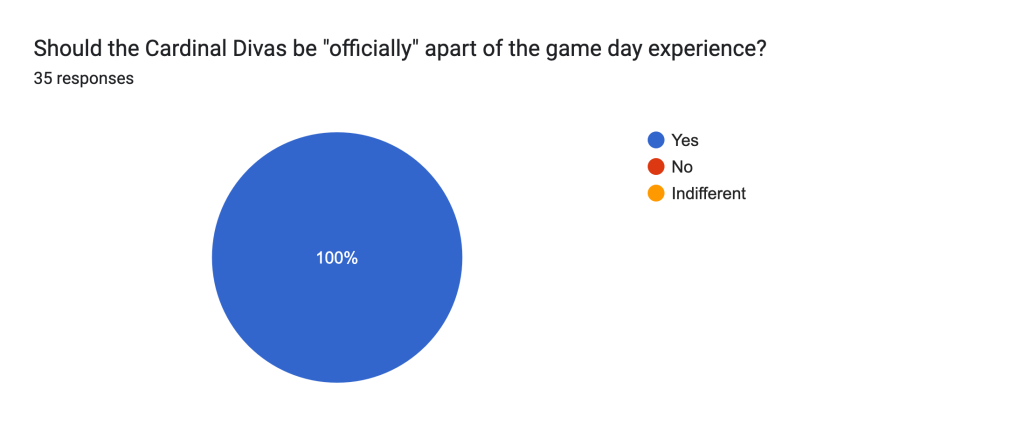
On social media, however, it was a different story.
Millions were debating on the Cardinal Divas of SC and members of the Black community were divided on the idea of establishing a majorette dance team at a predominately white institution.
“Didn’t see black girls doing dance but stole this entire style of dance from black women at HBCUs,”
@ThePoshLife_ on Twitter
Majorette dance is central to historically black colleges and universities and plays a major role in HBCU culture. The style of dance incorporates a variety of dance styles including West African, hip-hop, step, bucking, and jazz. Majorettes typically dance in the stands at sporting events to the music played by their school’s marching band.
Sacramento native Arielle Canedo-Mills left the West Coast to attend Prairie View A&M University where she dances on the school’s majorette dance team, The Black Foxes. The team was established in 1970 and dances alongside the PVAMU band called, The Marching Storm.
“Being a Black Fox at this school is really a big pillar of leadership,” said Canedo-Mills.
The Cardinal Divas of SC have been a topic of discussion amongst her majorette teammates. “We’ve been doing majorette dance for a long time, and they did it one time and they got really big publicity about it, and it’s like, we still get overlooked,” said Canedo-Mills.
The consensus amongst the team remains clear. “If she went on the show and said, ‘I want to pay tribute to Alcorn or Jackson State or ASU’, anybody. I think everybody would be pleased,” she finished.
Mass Communication major Keishon Groves is a senior at PVAMU and found out about the Cardinal Divas on Twitter. Groves is supportive of creating a Black space at a PWI, however questions the long-term future of the USC’s majorette team.
“If majorette dance is what she really loves doing, who are we to stop her from living in that space?”
Prairie View A&M University Student, Keishon Groves
“It won’t be executed in the same way that young woman has clearly practiced and put in time, and recruited and auditioned all these other women who stood behind her,” Groves explained.
Majorette dance is deeply rooted in music and dances with the school’s band. “People don’t play the same way that HBCU bands play,” Groves said. The USC Trojan Marching Band is skilled, however, they often don’t play the music intended for bucking and highly energized movements.
The Cardinal Divas also have great shoes to fill. “Our school has taken some of the best programs and turned them into something that people dream about being like from young ages.” Groves finished. As majorette dancers, the Cardinal Divas have become not only representatives of the school, but the Black community as a whole.
Kaufman student Jada Walker serves as co-captain and assists the team’s official choreographer, Jai Robinson. Growing up in Texas, Walker was surrounded and inspired by majorette at a young age. Her first time dancing with a marching band was at a Martin Luther King Jr. parade at a mere 3 years old.
“Everyone is inspired by someone. You have to see some team to form another team to see what your style is gonna be. You derive inspiration from everywhere,” Walker said.
“The artistry behind majorette really comes from the music, I feel like the music brings out the soul,” Walker said.
Hannah Eltridge is a member and serves as team treasurer for the Cardinal Divas. She found out about the team on social media and wanted to be a part of it because she danced majorette in high school and felt it was a step forward for the Black community at USC.
As a Dallas native, Eltridge grew up watching the Jackson State University Prancing J-Settes and the Dancing Dolls. After the social media wave, Eltridge was disheartened about false statements being made on social media due to the lack of accuracy from media organizations.
“People were saying that Princess was claiming to start the first majorette team and that wasn’t true at all,” Eltridge explained.
Many organizations failed to fact-check and wrote that the majorette team was the first at a predominantly white institution. Failing to mention the San Diego State University Diamonds and not mentioning the prolific majorette teams at HBCUs.
“I think a lot of people get their messages and news from really unreliable resources like Twitter and TikTok and don’t actually do research.”
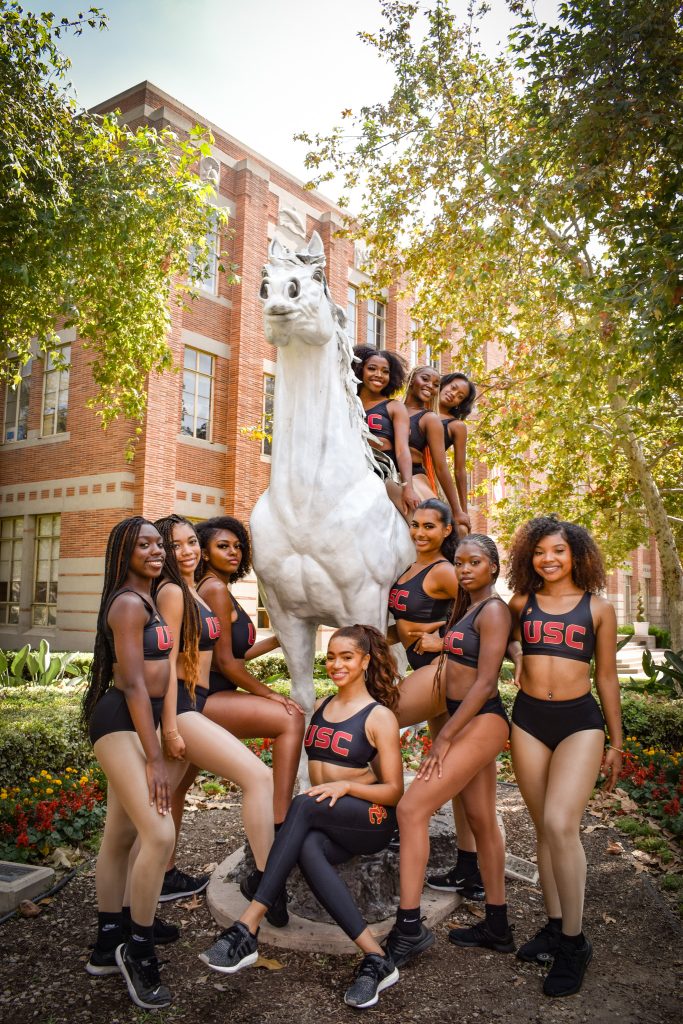
Thuc Nhi Nguyen covers college sports and the NBA for the Los Angeles Times. She wrote an article on the Cardinal Divas which the team has accounted as the most well-written and accurate out of all the press.
Nguyen placed great emphasis on fact-checking before publishing. “I think to do our job well as journalists, it’s to pay attention to all those things [facts]”, Nguyen said.
During the writing process, the most interesting aspect was how vastly layered the story was.
“There’s just a tension in starting a major at a team at a place like USC. That’s one. And then the second layer is. Are you guys going to get on the field ever, or when will you get on the field?”
Nyugen placed great importance on filling in the blanks and trying to answer as many questions as possible.
Akilah Perry is a sophomore majoring in Business Administration as is a member of the team. “I really wanted to join this majorette team because I’ve been dancing majorette since middle school and I wanted to get back involved in it somehow,” Perry said.
She never expected the majorette team to garner so much publicity, especially negative comments. “A lot of us on the team have done majorette prior to coming to USC, and are familiar with the style of dance, where it came from and what it meant to the Black community and HBCUs specifically,” Perry said.
Although she tries to ignore the negativity, Perry has fallen victim to the brutalities of social media. “I feel like reading the comments, people really do have some real things to say, but at the end of the day, it’s really a mindset thing and you have to know how to block off that negativity and keep pushing and keep striving,” Perry said.
Desi Philadelphia serves as the communication strategist and head writer for USC’s School of Cinematic Arts. As someone who has seen a majorette performance at an HBCU, she notes that the music and atmosphere are very different and cannot compare to the same experience at a PWI.
“It really doesn’t diminish the HBCU experience in any way, it’s just another place that we find ourselves as black people expressing our blackness,” Philadelphia explained.
USC Alum Danielle Harvey currently serves as the Interim Executive Director of the Black Alumni Association. She attended the football game where the Cardinal Divas made their debut, saw them on the jumbotron, and freaked.
“I was so proud to see our young women do something that is special to us and for us in a predominantly white institution,” Harvey said.
The BAA has a goal to strengthen the legacy of educational attainment and excellence of Black Trojans. Harvey strives to support, strengthen and serve as a leadership representation for current and future Black spaces.
From lighting the torch to the Trojan Horse, USC has always been a university rooted in traditions.
“I think it’s the elephant in the room, and I can tell you as having been a student at USC in the 90s. I remember being excited about the one Black girl on the Song Girls, because then it was like, ‘Oh, there we are.’ There’s the representation,” Harvey said.
After the divide on social media, Harvey was disappointed to see the sense of gatekeeping within the Black community. “We do need to see ourselves and be able to celebrate ourselves in the midst of right. I was definitely on the side of, no. We especially need it [majorette] at a place like USC,” said Harvey.
Harvey strives to support the Cardinal Divas and has scheduled for the majorette team to perform at the BAA tailgate for the Homecoming football game on November 5th.
Annenberg clinical professor Alison Trope believes that having a team like the Cardinal Divas of SC is long overdue due to the lack of representation from the university’s current dance teams, including the renowned Song Girls.
The Cardinal Divas not only have its own stylistic identity, having the new majorette team at USC allows young Black women to have a space to call their own which is very important at a PWI where they are systematically isolated.
“There was kind of a whiteness that was required to be performed, and I’ve heard this from some of the former Song Girls that I’ve had as students over the years around things like straightening of the hair. Around just sort of denying certain aspects of their identity to fit in, and sort of play to the conventions of what the Song Girls represented,” Trope said.
The USC Song Girls have been a school tradition for 54 years. “Unless the Song Girls were going to radically change and kind of rethink their identity as a team. Then it makes sense to have the Cardinal divas as an alternative,” said Trope.
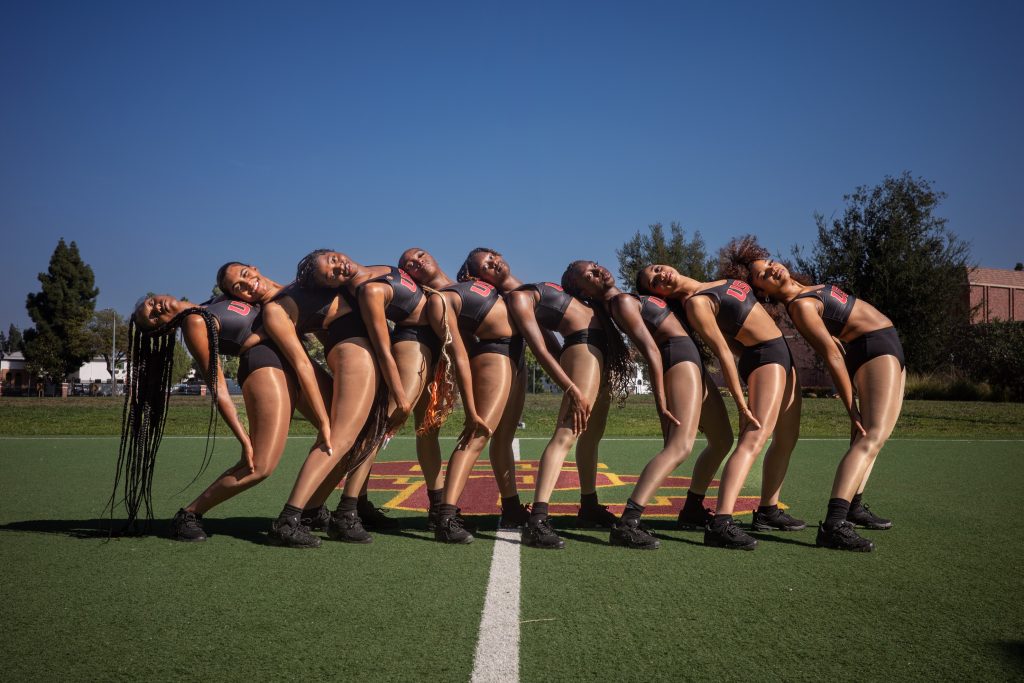
Since their debut almost two months ago, the Cardinal Divas have started a GoFundMe and raised over $14,000 in less than a month. Their main goal is to perform on the field.
“I want this to be the history that we keep continuing making, building, growing and transforming to make sure that black voices get seen, heard and recognized at our PWI,” said founder Princess Lang.
Princess Lang, Founder of the Cardinal Divas of SC
The Divas main goal is to perform halftime performances on the field of the Los Angeles Coliseum every football game. The team would also like to expand into different sports and hope to perform at all USC men’s basketball games. As of December, the majorette team will not be performing at the basketball games due to a lack of space. The Song Girls, Trojan Dance Force, and USC Spirit Leaders all perform at USC men’s and women’s basketball games. There have been no plans for inclusion this season.
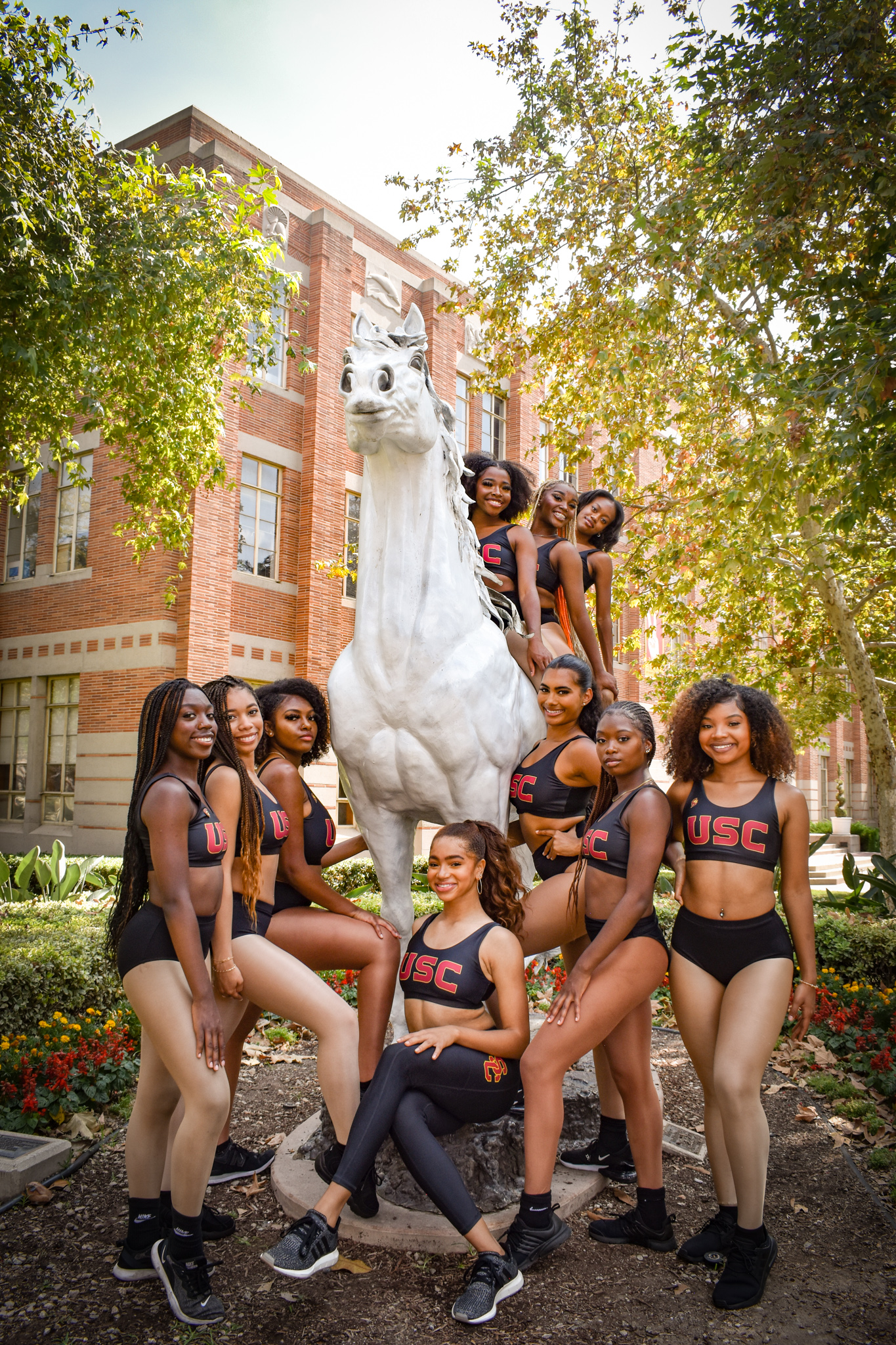
Leave a Reply